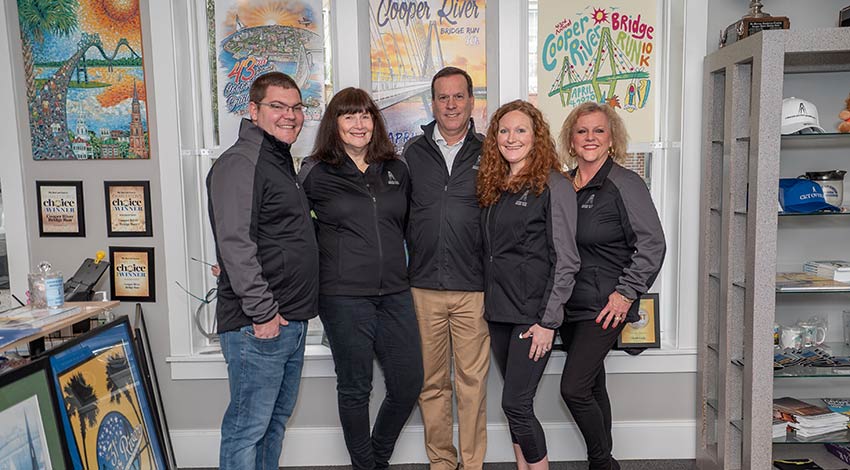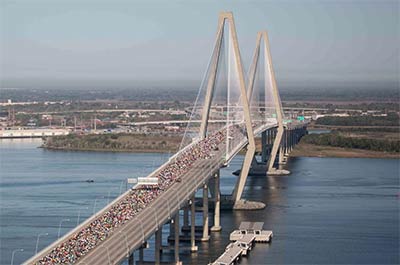
If you are new to the Charleston area, the Cooper River Bridge Run is kind of a big deal.
It sells out at 40,000 participants. It’s the third largest 10K in the United States. The two-day expo is one of the largest health and wellness expos in the country as well, featuring over 200 booths. There’s a direct economic impact in the Charleston area of $35 million. Some 250 busses transport participants to and from both the starting line and finish line. And, we can’t forget the water bottles. Around 82,000 are utilized during this race alone.
However, the actual race, this year held on April 4, is not an isolated event. It is accompanied by the massive two-day expo at the Charleston Area Convention Center; the Taste of the Bridge Run, also at the Charleston Area Convention Center, on the Friday night before it; the Kids Run, which will be held the Sunday before the race on March 29 at The Joe; and the Finish Festival.
All this is successfully achieved with just five full-time employees and two part-time staffers working out of an office on South Shelmore Boulevard in Mount Pleasant.
As a team, they work with a board of 14 people, representing different entities, such as the city of Charleston, the town of Mount Pleasant, Charleston County Park and Recreation, College of Charleston, the Convention and Visitors Bureau and the Charleston Medical Society. They meet monthly year-round. In addition, the team works with their sponsors, over 100 of them, and their 12 charities.
Assisting the staff year after year is an enormous volunteer effort. The Cooper River Bridge Run will utilize 4,000 volunteers from the Kids Run to the expo, and then, of course, during the race and at the Finish Festival.
The seven employees organize this epic race under the leadership of Irv Batten, deputy director of the Cooper River Bridge Run.
This year will be its 42nd year, and Batten has been the deputy director for the last six of those. “There are so many moving parts. Different aspects of the race are planned at different times during the year,” Batten said. “However, things are always changing. You have to be able to monitor and adjust and be quick on your feet.”
That happens to be something that Batten is quite good at since he is an avid runner himself. He’s coached local cross-country teams, he owned a Mount Pleasant running store and he has been involved with many local races over the years.
“Anything running related has been a passion of mine my whole life,” he said. “I have worn many hats over the years and this one seems to be a culmination of all the ones before.”
The late Julian Smith, who directed the Cooper River Bridge Run from 1994 to 2018, has been referred to as the “Father of the Bridge Run.” He and Batten were personal friends for many years and Batten said it was an honor to have worked with him before he passed away in 2019.
“It was Dr. Marcus Newberry’s idea to start the Cooper River Bridge Run back in 1978, but in 1994 when Julian became director, there were approximately 6,000 runners. During his tenure, he brought it up to 40,000, making it the third largest 10K in the country,” Batten explained.
Although Batten may have a tough act to follow, he is perfect for the position with such deep roots in the Charleston running community.
He’s quick to point out that he could not be successful without his team, which includes: Mark Cellers, assistant race director; Rachel Haynie, assistant race director; Lorrie Warren, special events director; Marcy Krawcheck, registration assistant; Benita Shaw, volunteer coordinator; and Scott Lewis, expo coordinator.
Said Shaw, “Irv has done a great job continuing Julian’s mission since January 2019 and the race was once again a big success on April 6, 2019.”
She said that the team behind the Cooper River Bridge Run is like a big family. “We each have our own individual roles but when crunch time arrives, we all roll up our sleeves and do whatever it takes to put on this amazing race.”
As the volunteer coordinator, Shaw is responsible for organizing the 4,000-plus volunteers from the starting line, including the recycling effort, corrals and the water stops; the Finish Festival with food service and with handing out medals to all the finishers; the two-day expo, where bib numbers, T-shirts and packets are distributed; the Taste of the Bridge Run, which is attended by over 1,500 participants; and the Kids Run.
“At the expo alone, we use over 1,000 volunteers in four-hour shifts during the two-day event,” she said. “I am most impressed by the fact that we deal with thousands of participants, sponsors, spectators, volunteers, vendors and companies, and each year our small staff succeeds in putting on a world-class event that’s seemingly flawless.”
Batten gives great credit to law enforcement, including the police and fire departments. “I have visited many of the largest races in the country to see how they are run, and we really have one of the safest events out there. Our security is considered state-of-the-art.” He added that the Coast Guard, SLED and state troopers are also involved in the race.
Having studied other races, he also pointed out that few races offer free bus transportation to the starting line and from the finish line. “We even offer race pickup and drop off for free from the Charleston Area Convention Center, which is where the expo takes place,” he said.
 Batten mentioned the fencing set up around the corral at the starting line, as well as the port-a-potties strategically placed at the starting and finish lines and along the way.
Batten mentioned the fencing set up around the corral at the starting line, as well as the port-a-potties strategically placed at the starting and finish lines and along the way.
“Participants have no idea how much thought is put into every little aspect of this event,” Batten added.
Public works, waste management and recycling are also all important aspects of the Cooper River Bridge Run.
“It really takes a major effort on the city of Charleston, the town of Mount Pleasant and Charleston County governments to come together to make this race happen. At times it seems like the Bridge Run is a well-oiled machine,” Batten admitted. “But I will say, we are always tweaking things to improve and stay on the cutting edge. We want participants to return and tell others how great our event is. Also, it helps that we are running in the most beautiful area.”
Pat Welch, representing the Charleston Running Club, is chairman of the board. He said that the board’s role is to provide organizational support and leadership for Batten and the staff.
“The most impressive part of the entire event is the hour before the start where you can witness first-hand how well the event has been planned down to the smallest detail,” Welch said. “With almost 40,000 runners staged in the starting corrals, it’s amazing to see how well the race is managed. There is no room for errors and the race has a history of success. It is a tribute to our past Director Julian Smith and now Irv Batten and his staff who have continued the tradition of putting on one of the top runs in the U.S.”
Being such a highly acclaimed race, it has attracted its fair share of talented individuals. Elite athletes from all over the world come to compete and to be the coveted winner of the Cooper River Bridge Run. Batten and his staff recognize many of these individuals in their “Hall of Fame” event during the expo and they also introduce the elite athletes that will be running, many of whom are Olympians.
The wheelchair race that begins 30 minutes before the runners take off has also included many past Olympians, according to Batten. “The wheelchair race has become quite popular and is a big part of the overall event. It garners quite a bit of attention,” he added.
With so many aspects of the Cooper River Bridge Run in general, it isn’t hard to see why so many people want to participate.
Dr. Newberry’s desire with the Cooper River Bridge was to promote health and fitness among the Charleston community. Just under 1,000 people registered that first year on April 2, 1978, which even at that time exceeded expectations. And 42 years later, here we are, with an expected 40,000 registrants trained and ready to “get over it”—a slogan the team coined for running across the picturesque Arthur Ravenel Jr. Bridge.
“This race is a reflection of our community and every single one of us on the team feels honored to be involved,” Batten concluded.
By Theresa Stratford

Leave a Reply